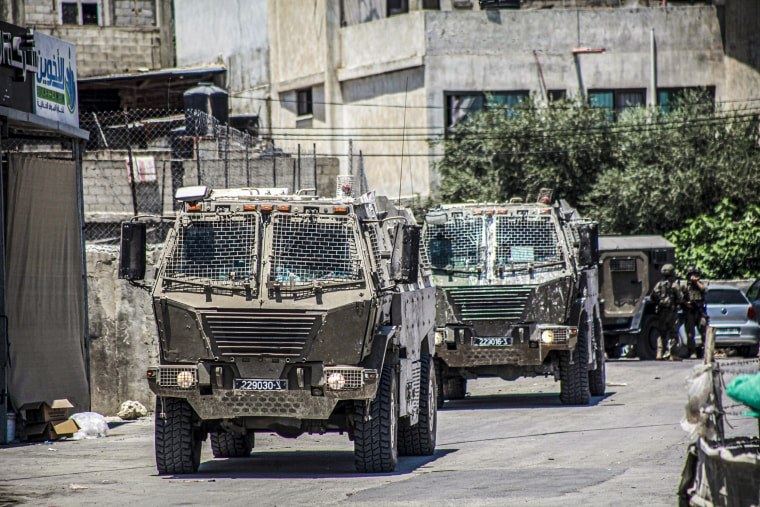Policies and practices used by Israel in its occupation of Palestinian territories are in breach of international law, the United Nations‘ top court said in a landmark opinion Friday.
The International Court of Justice said in its opinion, which was read out by Judge Nawaf Salam, president of the world body, that Israeli settlements in the occupied West Bank and East Jerusalem, as well as « the regime associated with them » were established and are being maintained in violation of international law.
The ICJ said Israel should cease all new settlement activities and evacuate settlers from Palestinian territories.
It further said that Israel systematically discriminated against Palestinians and branded the occupation of the territories as « de facto annexation, » and that Israel’s exploitation of natural resources in the Palestinian territories likewise violate international law.
Its “unlawful policies and practices” were “in breach of the Israeli government’s obligation to respect the right of the Palestinian people’s right to self-determination,” the court said.
The International Court of Justice, which is based at The Hague in the Netherlands, had been looking into the legal consequences of Israel’s occupation of Palestinian territories following a request from the United Nations General Assembly.
The General Assembly had asked the court in January 2023, prior to Hamas’ Oct. 7 attack and the start of the war in the Gaza Strip, to deliver an opinion on Israeli « policies and practices » toward Palestinians and on the legal status of the occupation of Palestinian territories, including the West Bank, east Jerusalem and Gaza.
In a statement on Friday, Prime Minister Benjamin Netanyahu dismissed the ICJ’s decision as “false,” saying that “The Jewish people are not conquerors in their own land,” referring to Jerusalem and the West Bank.
Mustafa Barghouti, general secretary of the Palestinian National Initiative and a veteran Palestinian political activist, welcomed the ICJ’s opinion as a “great victory for the Palestinian people and a major blow to Israel.”
“No more excuses. The international community must force Israel to end the occupation,” B’Tselem, a Jerusalem-based nonprofit organization that documents human rights violations in the Palestinian territories, said in a statement Friday.
The court’s advisory opinion is not legally binding, but it could have a significant political impact as Israel faces mounting backlash and isolation over its deadly military offensive in Gaza, where nearly 39,000 people, including thousands of children, have been killed since the war began, according to local health officials.
It also comes just a day after Israel’s parliament, the Knesset, voted overwhelmingly in favor of a resolution rejecting the establishment of a Palestinian state, despite growing pressure from the global community, including from the United States, which has for decades officially supported the idea of a two-state solution.
The ICJ’s opinion Friday is separate from another ongoing case brought to the court by South Africa accusing Israel of committing genocide in its offensive in Gaza, an accusation both the U.S. and Israel have denied.

The General Assembly had asked the ICJ to weigh in on the « legal consequences arising from the ongoing violation by Israel of the right of the Palestinian people to self-determination, from its prolonged occupation, settlement and annexation of the Palestinian territory occupied since 1967. »
It also asked the court to give its opinion on how the policies and practice of Israel affected the « legal status of the occupation » and what the legal consequences might be « for all States and the United Nations. »
Israel occupied the West Bank, east Jerusalem and the Gaza Strip in 1967 during the Six-Day War. In 2005, faced with international and domestic pressure, Israel withdrew troops and thousands of Israeli settlers from Gaza, leaving the enclave to be governed by the Palestinian Authority while continuing its occupation of the West Bank and Jerusalem.
In 2006, Hamas was elected into power, replacing the Palestinian Authority as Gaza’s governing body. In response, Israel significantly tightened its control over Gaza’s borders, coastline and airspace, imposing a blockade that, for 17 years, has crippled Gaza’s economy, with a widespread, devastating impact on Palestinian civilians’ daily lives. Israel says that the blockade is required to ensure the safety of its population from Hamas.
Across the West Bank, hundreds of thousands of Israelis have built sweeping settlements, many of which have displaced Palestinian communities. The international community largely considers these settlements to be illegal.
In March, Israel also approved the appropriation of nearly 5 square miles of land in the Jordan Valley, in the largest seizure of land in the West Bank in decades. U.N. spokesperson Stephane Dujarric called the move “a step in the wrong direction, » adding: “The direction we want to be heading is to find a negotiated two-state solution.”
Meanwhile, Israel’s annexation of east Jerusalem, where the city’s most sensitive holy sites are based, is not internationally recognized.
As an occupying power, Israel’s actions in the territories are expected to comply with rules under international law that govern occupation.
Prime Minister Benjamin Netanyahu has previously said Israel does not recognize the legitimacy of the discussions at the ICJ. He decried the case as part of a “Palestinian attempt to dictate the results” of a political agreement to the Israeli-Palestinian conflict without negotiations.







